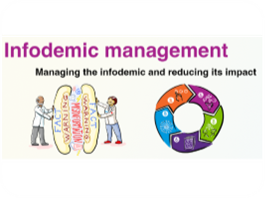Infodemic Management: Closing the Information Literacy Skills Gap
by Renata Mares, MIPH, BSN, BAKin, WHO IM
On May 5, 2023, the head of the UN World Health Organization (WHO) “declared ‘with great hope’ an end to COVID-19 as a public health emergency, stressing that it does not mean the disease is no longer a global threat.”
The Problem: Information Literacy Skills Gap
But the infodemic (which WHO defines as “too much information including false or misleading information in digital and physical environments during a disease outbreak”) rages on. It has been fueled by the 21st-century digital information age, and has moved way beyond the topic of COVID-19. Artificial intelligence is sowing further confusion.
Information is now a social determinant of health, much like other social forces and systems that impact and shape conditions of daily life. Social determinants have a much greater effect on health outcomes than lifestyle choices.
In this fast-paced world, some people know how to manage information, while others don’t. There is a skills gap in information literacy among healthcare professionals, and in society at large.
The Solution: Infodemic Management
Capacity building is the best way to address this skills gap. Therefore, WHO developed and implemented an approach called infodemic management (IM).
WHO’s IM Competency Framework
In the early days of the COVID-19 pandemic, WHO’s Department of Global Infectious Hazard Preparedness developed an IM competency framework. The team intended this framework to be used for training public health and other interested professionals in IM. 
In May 2023, WHO released Managing Infodemics in the 21st Century. This book includes a simplified version of a competency framework (as shown in the figure) that outlines key activities for IM:
- Use social listening and infodemic insights to understand the public's concerns and misinformation.
- Deliver high-quality health information and programming.
- Intervene through design, implementation, and evaluation.
- Promote and support resilience, healthy behaviors, and community engagement.
- Strengthen preparedness, planning, policy, and systems.
WHO's IM Training

Between 2020 and 2022, WHO’s infodemic team delivered SimEx-based IM training to more than 1,300 participants from 142 countries. (OpenWHO courses have over 20,000 participants.) Trainees gained evidence-based, innovative skills by collaborating to solve realistic but fictional problems asynchronously across up to 16 time zones.
This training not only revolutionized evidence-informed content sharing in health communication, but also built a culture of diversity, inclusion, and equity. Such a transdisciplinary approach demonstrated that the culture of old ways can be adapted and expanded within 1 to 2 years of IM training. This is one very creative way to reenergize professionals and build up motivation where moral injuries have occurred because of pandemic—and possibly prior workplace—cultural issues.
To Learn More About IM
Here are some resources on IM and living in harmony with technology.
Open-Access Book
Managing Infodemics in the 21st Century addresses the current information ecosystem and the challenges it brings. The sixth section (Smart Health! Expanding the Need for New Literacies) was written by Kristine Sørensen (president of the International Health Literacy Association and founder of the Global Health Literacy Academy). Sørensen describes how innovation in digital and non-digital solutions are impacting our daily lives. She explains that “smart health” information technology requires professionals of all kinds to upskill to deliver people-centered services in our complex world. In addition, she discusses the importance of literacy in five major areas: health, science, digital, information, and media.
The book also describes various other key skills, such as debunking, prebunking, and social listening. These skills are outlined in WHO’s IM competency framework.
Report
HX Report: Centering Our Tech Future Around Our Human Experience (developed by the non-profit All Tech Is Human) discusses how to use technology to promote the well-being of humanity. The report defines well-being as “workplace culture, work/life balance or integration, digital wellness, and mental health. It also includes issues of diversity, equity, and inclusion and other elements of community building.”
WHO’s IM News Flashes
WHO publishes news flashes on recent IM news, events, opportunities, and research. A recent issue provides IM training resources.
Online Trainings
Ready to learn some IM skills? Click the images below to be connected to training websites.
 |
 |
 |
|
WHO IM course series
- IM 101
- Developing insight reports
- Addressing health misinfo
- Social marketing and message testing methods
- More to come!
|
Comprehensive training
- Applying IM skills to global vaccine programming
|
Building vaccine confidence and demand in a digital age
- Applying IM skills to Canada's vaccine programming
|
About the Author

Renata is an adaptation and public health consultant with 15+ years of infectious disease expertise as a public health nurse and researcher across Canada and the southern hemisphere. She is a certified infodemic manager with the WHO and has supported their work in training healthcare providers. She teaches public health and global and indigenous health policy and practice as a sessional nurse educator in Canada and a research assistant with the Jitsuvax project. She is the founder of Adaptable Folks Inc. and can be reached at renata@adaptablefolks.com.
#IHABlog